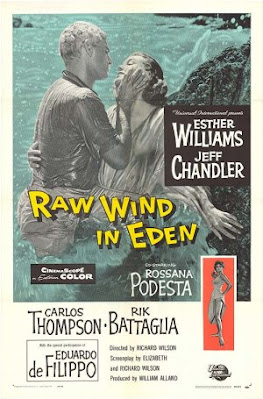 |
| Anthony Franciosa, Jean Simmons, Paul Douglas |
THIS COULD BE THE NIGHT (1957). Director: Robert Wise.
Anne Leeds (Jean Simmons of
Angel Face) is a schoolteacher who inexplicably gets part-time work as a secretary for one of the partners, Rocco (Paul Douglas), in a Manhattan nightclub. Rocco's partner, playboy Tony Armotti (Anthony Franciosa), thinks Anne, due to her upper-crust education, is stuck up and doesn't belong in the club, but Rocco takes a shine to her. As Tony and Anne work out their differences, other denizens of the club interact with our trio: singer Ivy (Julie Wilson); dancer Patsy (Neile Adams) and her mother Crystal (Joan Blondell); Hussein (Rafael Campos), a busboy who slowly warms up to Anne; and slick lawyer, Devlin (Tom Helmore). Will Anne and Tony ever get together, and what will Rocco think of it when they do?
 |
| Jean Simmons and Anthony Franciosa |
This Could Be the Night came out two years after the film version of
Guys and Dolls, which also starred Jean Simmons, and while it's a quite different story and may take place in a different time period, I doubt if it's a coincidence that it presents a "greenhorn" (virgin) interacting with various gangster and nightclub types. There are musical numbers in this, too, although they are integrated into the nightclub setting and
This Could is not a musical as such. The three leads all give very good performances. However, one has to say that while Franciosa is a very good and intense actor, he is not a charm boy. He plays a scene with some schoolchildren with absolutely no humor at all!
 |
| Simmons, Franciosa, and Rafael Campos |
Although one can understand why no cult grew up around singer Julie Wilson as it did around Judy Garland, she is a snazzy entertainer and is okay as an actress; she was essentially a cabaret star. Filipino Neile Adams appeared on Broadway, in a couple of films and several TV shows, but her chief claim to fame was as the wife of eventual superstar Steve McQueen (from 1956 - 1972). Joan Blondell is fat, unpleasantly brassy, and unappealing in this. Along with the leads Adams and Blondell are shown in the end credits, but not Rafael Campos, which is distinctly unfair. Talented Campos [
Lady in a Cage] is exuberant and quite good in the film and has at least as much to do as the other two. (Frankly, I didn't understand the whole business with Hussein being able to change his name if he passes an algebra test!?)
 |
| Franciosa with William Joyce |
Another interesting player is William (Ogden) Joyce, who plays Bruce, a fellow teacher of Anne's who, oddly, never gets to first base with her -- he isn't treated all that well. (Joyce is handsome and adept in this but his only leading role was in
I Eat Your Skin.) Attractive bandleader and trumpeter Ray Anthony [
Girls Town], one-time husband of Mamie Van Doren, is cast as himself and exudes charm, and J. Carrol Naish plays the club chef with his usual charisma. While the three lead characters are fairly well-developed, and there's some attempt to flesh out the supporting characters, the portraits tend to be on the superficial side. This is a somewhat unusual directorial assignment for Robert Wise. The film is sharply photographed by Russell Harlan.
Verdict: With good actors and several interesting sequences, this is smooth entertainment. ***.












































